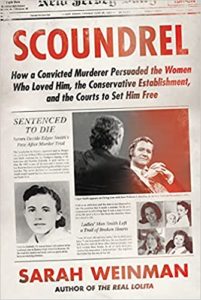 The legendary figure of the trickster has been part of English and American literature from the beginning. Ever since works like Defoe’s Moll Flanders and Melville’s The Confidence Man, readers have been perennially fascinated by tales of the pompous and privileged being made fools of by the humble and underprivileged, the overeducated dunce capped by the wisdom of the streets. And I’m here to tell you that modern times are no different, as evidenced by Sarah Weinman’s great new nonfiction book Scoundrel: How a Convicted Murderer Persuaded the Women Who Loved Him, the Conservative Establishment, and the Courts to Set Him Free. Oh, and did I mention that one of the hoodwinked was perhaps one the most privileged and pompous figures of his time, the revered public Conservative, William F. Buckley.
The legendary figure of the trickster has been part of English and American literature from the beginning. Ever since works like Defoe’s Moll Flanders and Melville’s The Confidence Man, readers have been perennially fascinated by tales of the pompous and privileged being made fools of by the humble and underprivileged, the overeducated dunce capped by the wisdom of the streets. And I’m here to tell you that modern times are no different, as evidenced by Sarah Weinman’s great new nonfiction book Scoundrel: How a Convicted Murderer Persuaded the Women Who Loved Him, the Conservative Establishment, and the Courts to Set Him Free. Oh, and did I mention that one of the hoodwinked was perhaps one the most privileged and pompous figures of his time, the revered public Conservative, William F. Buckley.
The criminal at the center of it all, Edgar Smith, was no charming rogue, though he later learned to present himself as one. Real crime has real consequences, and the girl he murdered, Victoria Zielinski, was far from this sexual psychopath’s first (or final) victim. Convicted by clear physical evidence and his own (soon retracted) confession, Smith was sent to the infamy of death row, giving him plenty of time to work on his prose and powers of persuasion while his case worked through appeals.
Like many self-improvers of his time, Smith read a lot of magazines, one of which was Buckley’s National Review, which he cited as something he’d hate to give up in an interview that came to Buckley’s attention. Beneficent Bill gave him a complimentary subscription, and the two began a self-consciously unlikely correspondence. Impressed by Smith’s style and the moral authority of a man condemned to die, Buckley encouraged his literary attempts and even introduced him to a sympathetic editor named Sophie Wilkins.
Part of the conman’s allure is the protean ability to appear to be what the mark wants, or rather hopes them to be. Although pro-Capital Punishment, the anti-government side of Buckley was a hooked by the thought of demonstrating his broadmindedness by supporting an unjustly condemned man of the people. It certainly helped that this man of the people expressed himself in such a charming National Review style. It’s fascinating to see how Smith baldly imitates Buckley’s ivy league letter writing, with it’s overblown phrases and quick descent into vulgarity and dialect jokes. Although his correspondence with the older Sophie began with her her desire to publish what would become his book, Brief Against Death, it soon devolved into different desires, in the familiar lonely hearts convict way, complete with pet names and paper sex.
It’s no spoiler to say that Smith gets out, thanks somewhat to, ironically, liberal winds in the air, but there’s is no question that his freedom would have been impossible without William Buckley. Once Smith was on the other side of the wall, it was a little harder to ignore the contradictions between the man that had disturbed Bill and Sophie at prison visiting hours and the one whose disembodied written words had so charmed them. It turns out that he was more interesting in there than out, but a lot more dangerous on the loose, and the results get messy and morally compromising, if, in true WASP style, never really acknowledged by stiff upper lip Buckley.
Reflecting on the whole thing years later Sophie wrote to Bill: There is certainly a book in the weird coming together of three people as different as the three of us, for a psychologist at least. Yes, there certainly is a book in it, a very good book for the psychologist in all of us, and we’re lucky Sarah Weinman wrote it. She’s a passionate researcher and expertly stitches together excavated quotes and writings of the three main actors, weaving the three strands of personality to tell the ultimately tragic tale.
Not everyone was fooled. My favorite comment is one rumored to have been spoken by the legendary Pat Buckley at a soiree attended by Edgar Smith: Get that murderer out of my bathroom! — Jamie Agnew